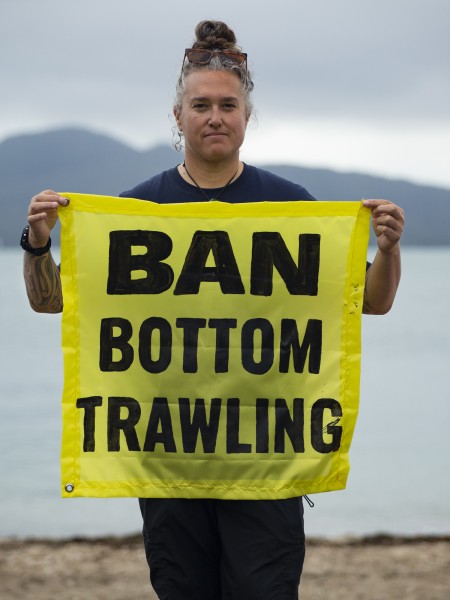
Bianca Ranson, Hauraki Gulf Coordinator at the Ban Bottom Trawling flotilla event, Mission Bay, April 2023. Image Bryce Groves, Greenpeace
Forest & Bird is calling on everyone who cares about the Hauraki Gulf Tīkapa Moana to tell the Government that no bottom trawling in the marine park is acceptable, after the Minister of Oceans and Fisheries announced the start of consultation on proposals to allow continued bottom trawling and Danish seining in parts of the Gulf.
The proposals by the Ministry of Primary Industries could see bottom trawling continuing in four large areas off the Coromandel Peninsula and Great Barrier Island, as well as parts of the inner Hauraki Gulf and in the sea offshore from Goat Island to Mangawhai Heads. All the proposals would see continued Danish seining in the inner Hauraki Gulf.
“The fact that all four of the proposed options include bottom-trawling and Danish seining is unfathomable,” says Bianca Ranson, Forest & Bird’s Hauraki Gulf Coordinator.
“There needs to be a fifth option in the consultation, an “option zero” – 100% no bottom trawling – which the public, alongside NGO's, iwi, and scientists, want. Bottom trawling, scallop dredging and Danish seining in the Gulf must end.”
Forest & Bird says the public needs to see what areas are currently trawled so they can compare those with protection proposals outlined in the consultation. The organisation doesn’t want a repeat of the 2006 deep water benthic protected areas situation where most of the protected areas were either not being fished or were so deep, they were already safe from bottom trawling.
“Trawling through a marine park is like taking a bulldozer to land in a national park,” Ms Ranson says. “Large, weighted nets and doors scrape across the seafloor to scoop up anything in its path, leaving damaged, scarce habitats unable to support abundant life. It is an incredibly destructive, industrial, fishing method and has no place in the Gulf.
“The Hauraki Gulf was declared a taonga when the Hauraki Gulf Marine Park Act was passed in 2000. Now it is time for the Government to show the public it truly values Tīkapa Moana as a taonga by stopping all destructive fishing practices and allowing Aotearoa New Zealand’s only marine park to recover.”
Earlier this year, the Hauraki Gulf Alliance (which include Forest & Bird, Greenpeace, Legasea, WWF-Aotearoa, NZ Underwater Association and NZ Sport Fishing) delivered a 36,000-strong petition to MPs outside Parliament calling for decision makers to act and ban bottom trawling, scallop dredging, and Danish seining from within the Hauraki Gulf Marine Park.
The Alliance represents the voices of tens of thousands of concerned New Zealanders who want to see urgent action to protect the Gulf's biodiversity and safeguard the future of its marine species. On Monday, the Alliance wrote to the Oceans and Fisheries Minister seeking the option of no bottom trawling to be added to the Government’s proposed consultation.
“Decades of overfishing and poor land management causing sedimentation and benthic damage have worsened the state of the Hauraki Gulf,” says Ms Ranson.
“We can already see the collapse of scallop and mussel beds, and functional extinction of many species. Caulerpa is in several locations through the Gulf and banning bottom trawling to limit further spread should be taken as a precaution.
“We are in a climate and biodiversity crisis and should be doing everything we can to revitalise the mauri and life-sustaining capacity of Tīkapa Moana and its treasure trove of marine life before it declines further into ecological collapse.
“It's not too late for us to take the bold action that is needed."
